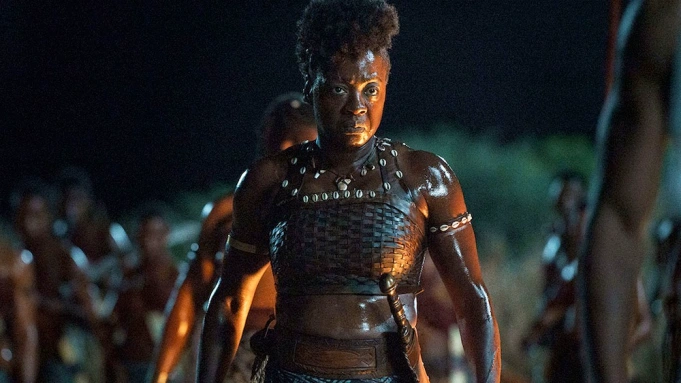“The Woman King” Depicts Female Empowerment at Its Fiercest

by Cailin Russell ‘23
 The Woman King, directed by Gina Prince-Bythewood, is based on a true story about an all-female warrior group that protected the West African kingdom of Dahomey during the 17th-19th centuries. Actress Viola Davis stars as Nanisca, a general who trains the Agojie to fight the Europeans and some Africans that had kidnapped Dahomey people to sell into slavery abroad. The Woman King is a captivating film with a great storyline. It has emotional depth and thrilling fight scenes while still being viewable for PG-13 audiences.
The Woman King, directed by Gina Prince-Bythewood, is based on a true story about an all-female warrior group that protected the West African kingdom of Dahomey during the 17th-19th centuries. Actress Viola Davis stars as Nanisca, a general who trains the Agojie to fight the Europeans and some Africans that had kidnapped Dahomey people to sell into slavery abroad. The Woman King is a captivating film with a great storyline. It has emotional depth and thrilling fight scenes while still being viewable for PG-13 audiences.
The Woman King encompasses the theme of female empowerment. In Dahomey culture, a married woman had to do whatever her husband commanded her. Their sole purpose was to bear children and take care of the household. The only other form of livelihood for a woman was to become Agojie. The kind of young women who joined the Agojie (the Dahomey king’s army) were those fleeing abusive husbands, those who had been sexually assaulted, and those who refused to accept their place as a man’s property. The Agojie was not just a warrior group. It was a sisterhood.
The film portrays that before becoming an Agojie member, the women go through special training that includes self-defense, weapon handling, rope tying, and running through physically grueling obstacle courses. As a result, Agojie women have no hesitation when it comes to slicing a man’s head off, or running full speed at a man with a spear. The Woman King effectively shows a tremendous amount of courage, discipline and strength.
Davis gives a breathtaking performance through her ability to depict both emotional depth and physical strength. Throughout the film, her character Nanisca must keep a strong outward appearance even when she feels afraid inside. In a scene towards the end of the film Nanisca comes to a startling realization as she sits with Nawi (played by Thuso Mbedu). Davis perfectly portrays Nanisca as a strong but also maternal woman who cares deeply about the welfare of her student, Nawi, just like a mother would. Nanisca shares some events from her past as she realizes that her past suffering has not been in vain. In the end, it leads to her proudest achievements.
Throughout history, the worth of women has been predominantly based on their beauty, their ability to bear children, and their subordination to men’s wills. Yet The Woman King shows the power of women who are given another kind of life. When offered freedom from abuse in exchange for high-caliber training as a soldier, these women protect their kingdom as if it were their own child. They sacrifice themselves for their village just as a mother makes sacrifices for her children. They value the essential importance of working cooperatively rather than competitively. The Woman King will appeal to anyone, but especially to young women. It will remind them that no matter what they are going through in life, they are stronger than they think they are.
Grade: A